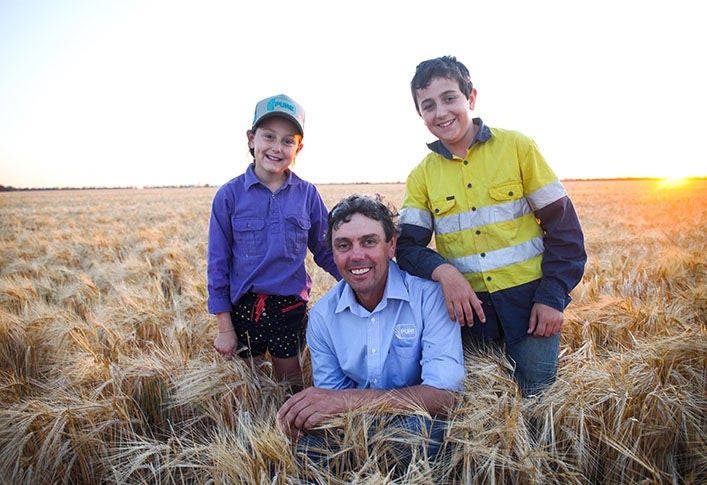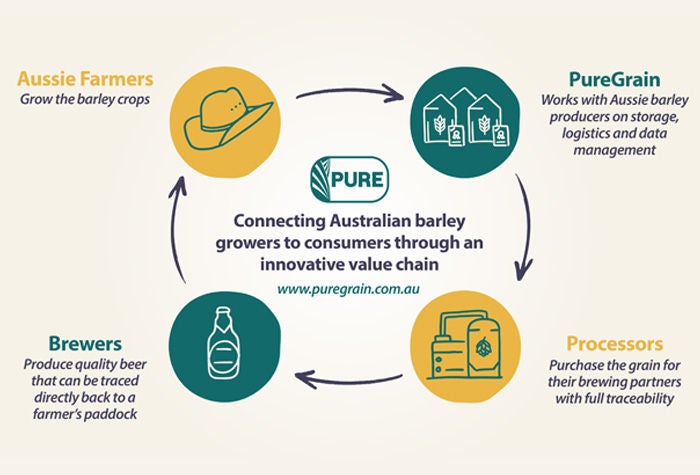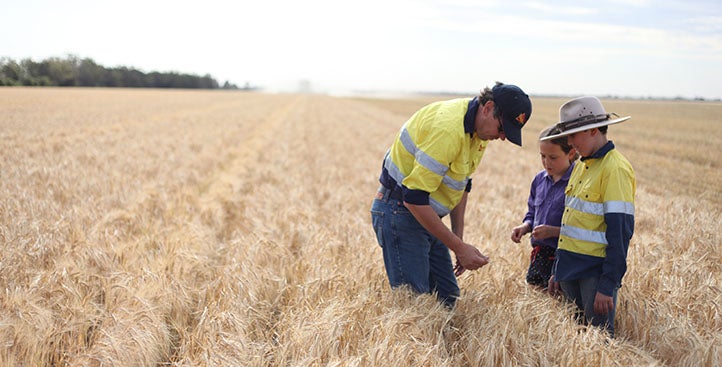Posted by on
16/03/2022
Off the back of the successful ‘Paddock to Plate’ movement, one northern NSW grain grower is spearheading the ‘Seed to Sip’ experience, redefining traditional supply chains to ensure beer drinkers across the globe know exactly where their product comes from.
Stuart Tighe is a Northern NSW farmer who specialises in producing lager’s key ingredient, malt barley, and identified on his own farms the benefits of selling grain directly to malt houses and brewers.
And now this rural innovator, together with wife Lyndall, has expanded the concept, establishing a national network of growers and on-farm storage handling platform, Pure Grain, which enables growers Australia-wide to bypass bulk grain handlers and sell their grain directly to brewers.
In turn, malt houses and brewers now have a pathway to Australian-grown barley at scale, and a unique opportunity to trace produce directly back to individual growers, unlocking a wealth of data for absolute transparency.
Opening up the supply chain
For the first time, Stuart said, supply chain dialog had opened between processors and farmers, increasing efficiencies and helping correct any consumer disconnect.
“Previously grain was sold to a handler as a bulk commodity, with no direct relationship between the grower and the processor, resulting in a lack of understanding between the growers’ or the processors’ objectives,” Stuart explained.
“Pure Grain’s aim is to align these objectives so we can build a sustainable and equitable supply chain, generate value, and deliver a premium product to the consumer.”
The ability to de-commoditise a bulk commodity – categorising various grain varieties into specific products – represents one of the Pure Grain’s greatest opportunities for both processors and farmers. Pure Grain’s on farm storage accreditation and data collection systems enable grain storage to be tailored to specification.
“Traditionally, large exporters and bulk handlers use generic specifications as grain is purchased through multiple growers, negating any opportunity for transparency or access to individual growers.”
“At Pure Grain, we are able to narrow our specs, enabling optimal processing efficiency,” Stuart said. ”For example, even with two varieties of APH2 there can be significant variances in how the different grain mills, water-use during processing or even colour, and we utilise the grower’s segregation and storage capabilities to cater for this.”
“If there’s grain that is more water use efficient during processing, equating to faster production and less power usage, it’s identified and separately stored – representing significant value for the malt house or brewer,” Stuart said. “And, of course, the grower.” One of Pure Grain’s core sustainability philosophies is to identity value then ask for this to be shared equitable across the supply chain.

Grain growers’ time to shine
The heart of Pure Grain, Stuart stresses, is the farmer.
After years of being price spectators, he believes this model finally gives grain producers the chance to have a seat at the table when it comes to negotiating price and hold processors accountable.
“Pure Grain is only interested in partnering with processors who are willing to share this newfound equity with growers on the ground, if they’re not willing to pass this value on, then we’re just not interested.”
“Our Australian grain growers are some of the most sustainable and progressive in the world. Thanks to productive soils, our healthy appetite towards technology, and democratic freedom with little government intervention and tariffs, we produce some of the world’s best grain – yet we have never been able to demand a price premium in return.”
Pure Grain is also helping maltsters and brewers further leverage Australian grain’s high quality, clean, green reputation, and capitalise on consumers’ renewed thirst for food provenance and carbon neutral produce.
“We’re seeing the marketing value brewers can generate from products thanks to their ability to now genuinely share the Australian farming narrative and educate consumers – but again, this is value we are ensuring is shared along the supply chain.”
Data driven approach underpins production, and regulation
Pure Grain’s data collection capability is perhaps the key tool creating supply chain value, and represents information gold for brewers and malt houses.
“Data is input regularly by growers, and processors can see everything from the soil health of a paddock to planting schedules or yield results, right down to chiller counts or the soil moisture content of fallows. We give brewers the assurance that their grain is grown, stored and transported correctly, with data tracked throughout the whole supply chain,” Stuart said.
Grain production data, Stuart said, in turn enabled brewers and malt houses to set their own production forecasts, produce consistent flavour and ensure just in time-delivery – or pivot if necessary.
With global food and beverage manufacturers under increasing scrutiny to meet internal, and in some countries, external, ESG targets and regulations, Stuart said, Pure Grain’s data also eased this process for malt houses and brewers considerably.
“Processors now have all the information they need to meet their regulations at the click of a mouse. Australian grain growers have one of the lowest carbon footprint to produce a tonne of grain, and easily meet the minimum global ESG supply chain export criteria, and Pure Grain packages all this information so it’s passed directly from the farm to the processor,” Stuart said.
In a sign of industry direction, Stuart said some processors even request detail on the gender equality of staff on-farm, or what percentage of a farm budget is being spent locally – such is their focus on community and social justice.
He said, ESG regulation was moving so fast in other countries that processors who currently have no relationship with their suppliers will find it very difficult to move forward.
“Pure Grain has identified this industry progression, and is helping processors stay one step ahead – but we’re also creating value by asking ‘what’s this information worth to you’, and then ensuring it is shared with the grower.”

Taking on Australia, and the world
Boasting an extensive client list, including Asahi Beverages, which owns Carlton & United Breweries and produces, Great Northern, VB, Corona and Balter, as well as United Malt Group which supplies Lion and its signature XXXX, as well as craft brewers such as Black Hops supplied through Cryer Malt – Pure Grain’s grain growers supply them all.
And off this success, Pure Grain is now looking to source milling wheat and replicate its model for wheat growers.
“We’ve been approached by processors looking to form relationships with farmers to source quality grain for bread, biscuits and noodles, which is a really exciting prospect.”
With a full-time staff of 11 based in the head office in Moree, Pure Grain has already secured growers across all grain growing regions of Australia, totalling some 150,000 hectares to help ensure a greater geographic supply advantage.
It’s ambitious vision for a grain grower from Pallamallawa only just tipping the other side of 40, but Stuart’s never been afraid to chase unprecedented targets.
Having arrived in the district in his early 20s, Stuart worked around the clock contracting until he and Lyndall could afford their first farm – on which they still live with their four children.
Their farming business, Boolah Partnership enjoyed enormous growth over the past two decades, Stuart’s thirst for innovation and efficiency gains launching him into the national spotlight, and at just 36 he was one of only three exclusive suppliers to Crown Larger.
Pure Grain, he believes, is the next logical step in national supply chain efficiency, and he remains undaunted by the task at hand.
And with a disruption to the feed and export grain supply chains also in his sights, its certain that this is only the start of the Pure Grain story.
